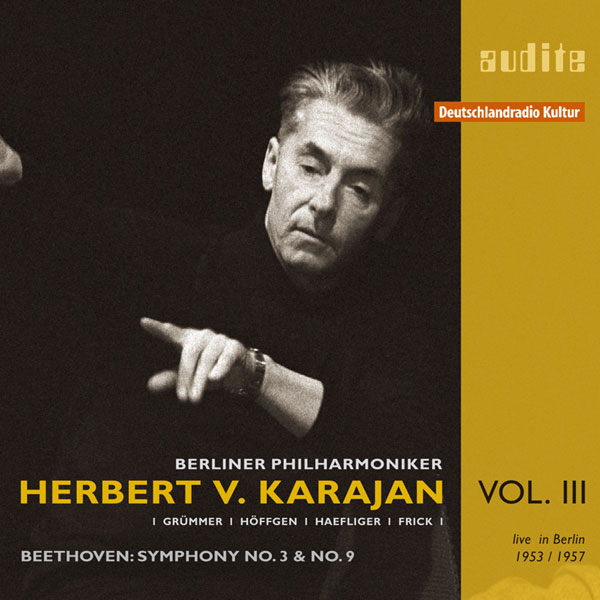Logowanie
Dziś nikt już tak genialnie nie jazzuje!
Bobby Hutcherson, Joe Sample
San Francisco
SHM-CD/SACD - NOWY FORMAT - DŻWIĘK TAK CZYSTY, JAK Z CZASU WIELKIEGO WYBUCHU!
Wayne Shorter, Freddie Hubbard, Herbie Hancock, Ron Carter, Elvin Jones
Speak no evil
UHQCD - dotknij Oryginału - MQA (Master Quality Authenticated)
Chesky! Niezmiennie perfekcyjny
Winylowy niezbędnik
ClearAudio
Double Matrix Professional - Sonic
najbardziej inteligentna i skuteczna pralka do płyt winylowych wszelkiego typu - całkowicie automatyczna
BEETHOVEN, Elisabeth Grummer, Herbert von Karajan, Berliner Philharmoniker
Symphony No. 3 in E-flat major, Op. 55 'Eroica' // Symphony No. 9 in D minor, Op. 125 - 2CD
- Applause
- BEETHOVEN
- Symphony No. 3 in E-flat major, Op. 55 'Eroica' - Berlin 1953
- Allegro con brio
- Marcia funebre: Adagio assai
- Scherzo: Allegro vivace
- Finale: Allegro molto – Poco Andante – Presto
- Applause
- Applause
- BEETHOVEN
- Symphony No. 9 in D minor, Op. 125 - Berlin 1957
- Allegro, ma non troppo – un poco maestoso
- Molto vivace
- Adagio molto e cantabile
- Presto – Allegro assai
- Applause
- Elisabeth Grummer - soprano
- Herbert von Karajan - conductor
- Berliner Philharmoniker - orchestra
- BEETHOVEN
Pierwszy raz od czasu rejestracji udostępniono materiał utrwalony przez inżynierów berlińskiej rozgłośni radiowej RIAS, na magnetofonach o szybkości przesuwu taśmy przed głowicą 76 cm/s.
Wszystkie publikowane wcześniej nagrania pochodziły z kopii wykonanych na początku lat 50. ubiegłego stulecia, wykonanych na taśmach o prędkości przesuwu przed głowicą 38 cm/s.
 Dzięki subtelnemu remsteringowi i doskonałej jakości zapisu pierwotnego - otrzymaliśmy materiał muzyczny zaskakujący świeżością, barwą dźwięku, wspaniałą sceną i selektywnością brzmień poszczególnych instrumentów.
REWELACJA!!!
These recordings of two Beethoven symphonies date from a period of change in the history of the Berlin Philharmonic. Furtwängler was again its official principal conductor, but his declining health and other personal reasons left him unable to supervise the orchestra on a continuous basis. Ever since his first encounter with the Berlin Philharmonic Herbert von Karajan wanted nothing more than to be its principal conductor. These recordings shed light on his early work with the orchestra as a visiting conductor and as the successor to Wilhelm Furtwängler.
Karajan’s first post-war concert with the orchestra, featuring Beethoven’s Eroica, on 8 September 1953 reveals not only the actual condition of the orchestra but also what Karajan was able to accomplish as a conductor in this situation. At the time Karajan was mainly busy with the London Philharmonia Orchestra and raved about its virtuosity. Yet, in the Berlin Philharmonic, he discovered dimensions that transcended virtuosity, powers of expression that went beyond rehearsal levels in the moment of performance.
At the time of the live-recording of Beethoven’s Ninth, performed in the auditorium of the Berlin Musikhochschule on 25 April 1957 to celebrate the orchestra’s seventy-fifth anniversary, Karajan was already the orchestra’s principal conductor. The orchestra was in a phase of tedious remodeling caused by Karajan’s attempts to shape the sound of the orchestra according to his musical philosophy. Beethoven’s Ninth, with a sterling quartet of vocal soloists, has a large-scale command of form and a dense, coherent sound that reveal Karajan well on his way to the first complete recording of the symphonies.
Dzięki subtelnemu remsteringowi i doskonałej jakości zapisu pierwotnego - otrzymaliśmy materiał muzyczny zaskakujący świeżością, barwą dźwięku, wspaniałą sceną i selektywnością brzmień poszczególnych instrumentów.
REWELACJA!!!
These recordings of two Beethoven symphonies date from a period of change in the history of the Berlin Philharmonic. Furtwängler was again its official principal conductor, but his declining health and other personal reasons left him unable to supervise the orchestra on a continuous basis. Ever since his first encounter with the Berlin Philharmonic Herbert von Karajan wanted nothing more than to be its principal conductor. These recordings shed light on his early work with the orchestra as a visiting conductor and as the successor to Wilhelm Furtwängler.
Karajan’s first post-war concert with the orchestra, featuring Beethoven’s Eroica, on 8 September 1953 reveals not only the actual condition of the orchestra but also what Karajan was able to accomplish as a conductor in this situation. At the time Karajan was mainly busy with the London Philharmonia Orchestra and raved about its virtuosity. Yet, in the Berlin Philharmonic, he discovered dimensions that transcended virtuosity, powers of expression that went beyond rehearsal levels in the moment of performance.
At the time of the live-recording of Beethoven’s Ninth, performed in the auditorium of the Berlin Musikhochschule on 25 April 1957 to celebrate the orchestra’s seventy-fifth anniversary, Karajan was already the orchestra’s principal conductor. The orchestra was in a phase of tedious remodeling caused by Karajan’s attempts to shape the sound of the orchestra according to his musical philosophy. Beethoven’s Ninth, with a sterling quartet of vocal soloists, has a large-scale command of form and a dense, coherent sound that reveal Karajan well on his way to the first complete recording of the symphonies.


































